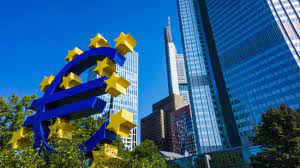
Policymakers at the European Central Bank made the case on Saturday for a large interest rate hike next month, arguing that inflation remains uncomfortably high and that the public may be losing faith in the bank's ability to combat inflation.
The ECB raised rates by 50 basis points to zero last month, and a similar or even larger move is now expected on September 8, partly due to sky-high inflation and partly due to the US Federal Reserve's unusually large steps.
ECB board member Isabel Schnabel, French Central Bank chief Francois Villeroy de Galhau, and Latvian central bank Governor Martins Kazaks all argued for forceful or significant policy action at the Fed's annual Jackson Hole Economic Symposium.
"Both the likelihood and the cost of current high inflation becoming entrenched in expectations are uncomfortably high," Schnabel said. "In this environment, central banks need to act forcefully."
Until recently, markets were betting on a 50 basis point move on September 8, but a number of policymakers, speaking on and off the record, now argue that a 75 basis point move should also be considered.
"Frontloading rate hikes is a reasonable policy choice," Kazaks, told Reuters. "We should be open to discussing both 50 and 75 basis points as possible moves. From the current perspective, it should at least be 50."
The policymakers argued that rate hikes should continue.
With rates at zero, the ECB stimulates the economy while remaining far from the neutral rate, which economists estimate to be around 1.5 per cent.
Villeroy predicted that the neutral rate would be reached by the end of the year, while Kazaks predicted that it would be reached in the first quarter of next year.
"In my view, we could be there before the end of the year, after another significant step in September," Villeroy said.
Schnabel also warned that inflation expectations were at risk of rising above the ECB's 2 per cent medium-term target, or "de-anchoring," and that public trust in central banks had begun to dwindle.
The rate increases come as the eurozone's growth slows and the risk of a recession grows.
However, the recession will be primarily caused by rising energy prices, against which monetary policy will be powerless. Many argue that the downturn will not have enough of an impact on price growth to bring inflation back to target without policy tightening.
The impending downturn is an argument for delaying rate hikes because it is difficult to communicate policy tightening when the slowdown is already evident.
"With this high inflation, avoiding a recession will be difficult, the risk is substantial and a technical recession is very likely," Kazaks said.
(Source:www.cnbc.com)
The ECB raised rates by 50 basis points to zero last month, and a similar or even larger move is now expected on September 8, partly due to sky-high inflation and partly due to the US Federal Reserve's unusually large steps.
ECB board member Isabel Schnabel, French Central Bank chief Francois Villeroy de Galhau, and Latvian central bank Governor Martins Kazaks all argued for forceful or significant policy action at the Fed's annual Jackson Hole Economic Symposium.
"Both the likelihood and the cost of current high inflation becoming entrenched in expectations are uncomfortably high," Schnabel said. "In this environment, central banks need to act forcefully."
Until recently, markets were betting on a 50 basis point move on September 8, but a number of policymakers, speaking on and off the record, now argue that a 75 basis point move should also be considered.
"Frontloading rate hikes is a reasonable policy choice," Kazaks, told Reuters. "We should be open to discussing both 50 and 75 basis points as possible moves. From the current perspective, it should at least be 50."
The policymakers argued that rate hikes should continue.
With rates at zero, the ECB stimulates the economy while remaining far from the neutral rate, which economists estimate to be around 1.5 per cent.
Villeroy predicted that the neutral rate would be reached by the end of the year, while Kazaks predicted that it would be reached in the first quarter of next year.
"In my view, we could be there before the end of the year, after another significant step in September," Villeroy said.
Schnabel also warned that inflation expectations were at risk of rising above the ECB's 2 per cent medium-term target, or "de-anchoring," and that public trust in central banks had begun to dwindle.
The rate increases come as the eurozone's growth slows and the risk of a recession grows.
However, the recession will be primarily caused by rising energy prices, against which monetary policy will be powerless. Many argue that the downturn will not have enough of an impact on price growth to bring inflation back to target without policy tightening.
The impending downturn is an argument for delaying rate hikes because it is difficult to communicate policy tightening when the slowdown is already evident.
"With this high inflation, avoiding a recession will be difficult, the risk is substantial and a technical recession is very likely," Kazaks said.
(Source:www.cnbc.com)





